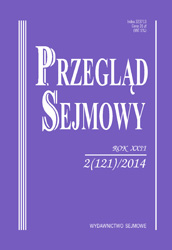Wolność sumienia, religii i światopoglądu w niemieckim i amerykańskim prawie pracy — wybrane przykłady regulacji prawnych i orzecznictwa
Freedom of Conscience, Religion and Belief in the German and U.S. Labor Law: Selected Examples of Legislation and Case Law
Author(s): Ewa Tuora-SchwierskottSubject(s): Constitutional Law, Philosophy of Law, Sociology of Law
Published by: Kancelaria Sejmu
Keywords: freedom of conscience and religion; separation of church and state; the conflict of conscience in the workplace; the rights and freedoms of the individual; religious holidays and the workplace; ideolo
Summary/Abstract: Freedom of conscience and religion also applies to conflicts in the workplace. In the Federal Republicof Germany and the U.S. legislation and the jurisprudence have developed certain standards ofconduct in such cases. In the German system, the issue of conscience in the workplace is governedby the principle of pacta sunt servanda (agreements must be kept) enshrined in the Civil Code (BGB).In the United States the freedom of conscience and religion is guaranteed by the provisionsof Title VII of the Civil Rights Act l964. In such cases, the duty of the employer is to examine theconfl icting interests of employer and employee, and to consider whether the resulting confl ict can beresolved without harm to the company. Such conflicts usually occur when the time of work coincideswith e.g. the time of prayer or religious holidays of the employee. In such a situation, the employeris obliged to examine and change the workplace organization, so as to enable the employee to carryout his/her obligations under religious law. Only when it is impossible to reconcile the confl ictinginterests of the employee and the employer, that the interest of the employer prevails over the interestof the employee. In Germany and the United States courts in their judgments have developed preciserules for the interpretation of freedom of conscience and religion under labour law, having regardto the rights of the employee and the employer’s interest. These judgments have become thebenchmark for resolving disputes arising out of violations of freedom of conscience, religion orbelief, and may also affect the legislation of other countries.
Journal: Przegląd Sejmowy
- Issue Year: 2014
- Issue No: 2
- Page Range: 77-87
- Page Count: 11
- Language: Polish

